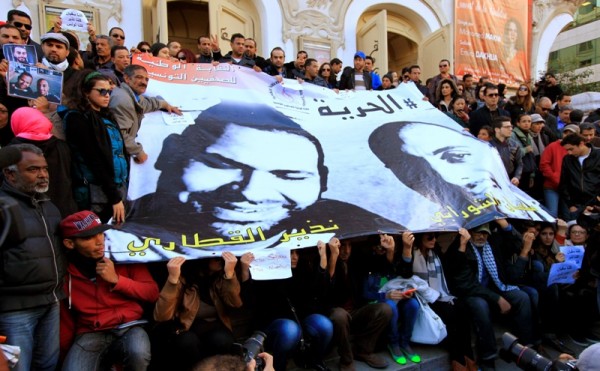Attacks on journalists and an effort to stifle communications continue on Libya’s tenth day of massive anti-regime protests, despite the arrival of foreign journalists into the country.
Colonel Muammar Qaddafi and his regime’s supporters are using live ammunition and fighter planes to deter protestors in the capital city of Tripoli, while in Benghazi, the anti-regime movement gained the upper hand when members of the state security abandoned their posts to join the protesters, news reports say. Against this backdrop come reports of violence against reporters and continued attempts to block communications.
“As the revolutions in Tunisia and Egypt showed, no amount of censorship and threats against the media will stop the story from getting out,” said IPI Press Freedom Manager Anthony Mills. “As the uprising in Libya continues, all parties must remember that journalists should be allowed to exercise their profession and report on the unfolding events.”
Journalist Atef Al-Atrash, who writes for online newspaper Quryna, has been missing since 18 February, when he gave a live interview to Al-Jazeera, the Committee to Protect Journalists (CPJ) and Reporters Without Borders (RSF) reported. IPI efforts to reach Quryna today were unsuccessful. News reports indicate that other journalists have also been detained or gone missing. On Monday, the Wall Street Journal quoted a Libyan journalist as saying “some of his colleagues who had spoken with Arab television stations had been arrested within minutes of speaking on air.”
A roundup of reports on Libyan radio from the Media Network of Radio Netherlands Worldwide, published on 21 February, said that protesters had launched several new services, two of which are named Voice of Free Libya Radio and Free Libya Radio. A local radio station that had been broadcasting opposition messages was reportedly attacked, the New York Times reported today.
With border controls weakened, foreign correspondents were able to enter the country yesterday for the first time since the demonstrations began on 14 February. CNN’s Ben Wedeman was the first Western journalist to enter the country, the network reported. “On the Libyan side, there were no officials, no passport control, no customs,” writes Wedeman. He reported: “The cell phone system is still functioning, though you can’t call abroad. The internet, however, has been down for days.”
Cell phone access and internet availability have been intermittent over the past few days, news reports say. While the cause of the outages in Libya cannot be definitely linked to the Qaddafi regime, the fact that access to the internet is controlled by a sole, state-run company would theoretically make such a shutdown easier for the authorities, CNN quotes the co-founder of Renesys, an internet traffic monitor, as saying.
The Libyan embassy in Vienna, which today announced its support for the protestors and condemned killings, would not provide any further comment on the media situation.

